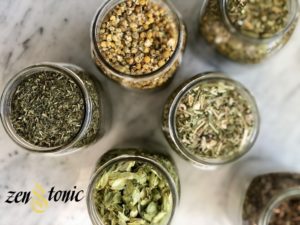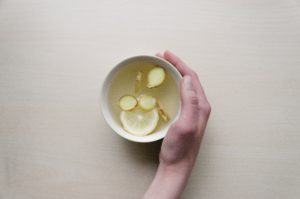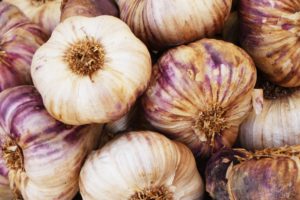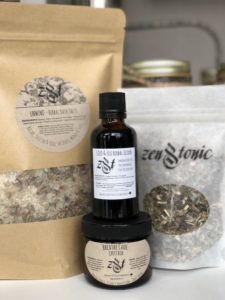As the days grow shorter and the nights become colder, we begin to settle into the comforts this chillier weather brings, such as big knit sweaters, the infamous pumpkin spice latte and those hearty soups and stews. Along with these comforts, this colder weather also brings less sunlight, more time indoors, cravings for comfort foods and the dreaded cold & flu.
For many, the cold & flu seems unavoidable due to their work environments, public commutes, kids at school or their health history. Luckily, mother nature has provided us with many tools to stay healthy and support our immunity during this chilly season. A nourishing diet rich in vegetables and whole foods, supplements such as vitamin C, D, zinc and my favorite herbs are essential resources during the cold & flu season.
 Herbs are the perfect addition to one’s cold season routine as they have a special affinity to work alongside our bodies, boosting our innate healing capabilities, further strengthening our immunity and overall systems. Here are my six favorite cold & flu herbs of which are antiviral, anti-microbial, immune-boosting, warming, mucous reducing and more!
Herbs are the perfect addition to one’s cold season routine as they have a special affinity to work alongside our bodies, boosting our innate healing capabilities, further strengthening our immunity and overall systems. Here are my six favorite cold & flu herbs of which are antiviral, anti-microbial, immune-boosting, warming, mucous reducing and more!
My favorite way to enjoy them is as a strong herbal infusion (steeped tea) in order to relax, stay warm and hydrated. They can also be used through herbal tinctures (herbal-alcohol infusion) or herbal syrups, of which all can be found at Zen & Tonic!
Elder (Sambucus nigra): This invaluable herb is a must during cold and flu season as it offers a wealth of benefits including anti-viral, immunomodulating, antioxidant rich and anti-inflammatory properties. Both the flowers and berries offer incredible medicinal support and have been shown to be as effective as modern cold & flu drugs, without the risk of negative side effects!
Elderberries work effectively in treating upper respiratory infections, reducing symptoms & length of a flu, as well as supporting a healthy fever – which is often our body’s best defence again illness. As the berries are extremely rich in flavonoids and antioxidants they also support eye health, reduce inflammation and can decrease arthritic pain.
How to use:
- Elderberry syrup, Elderflower tea or as a tincture in either berry or flower form
Best time to use:
- Use Elder at the first sign of a cold or flu and use throughout the illness
- Use for viral infections

Astragulus (Astragulus membranaceus): Are you sick all the time or finding that you try everything to avoid that nasty cold yet still manage to get sick? Astragulus may be your new best friend with its affinity for boosting and strengthening the immune system. Astragulus is an immunomodulator, rich in antioxidants, an adaptogen and consists of many protective properties for the liver, heart, and kidneys. This powerful herb helps support and restore total body health! In fact, Astragulus has the ability to increase white blood cell count, decrease viral replication and stimulate the production of T killer cells! Introducing the regular use of Astragulus, alongside the supplementation of Vitamin D3, may be your key to boosting your immunity & reducing the frequency of colds and flu!
How to use:
- Astragulus tincture or a decoction of Astragulus Tea (boiled for minimum 20 minutes)
- Add Astragulus to soups & broths
Best time to use:
- As Astragulus deeply nourishes the body, don’t expect results overnight! Use Astragulus throughout the year to support total body health.
- Avoid during acute illness.
*Be sure to purchase Astragulus membranaceus and avoid other variations
**Do not use Astragulus if on immunosuppressive medication
Echinacea (Echinacea spp.): Echinacea is not only a beautiful flower but also a treasured herb during times of sickness and chillier temperatures. With immune-modulating properties to increase white blood cell count and improve resistance again various types of infections, it is no wonder that Echinacea is one of the most used herbs during the cold & flu season. The polysaccharides and other constituents in Echinacea activate phagocytosis. This supports your body to more readily clear and inactivate pathogens, as well as accelerating your body’s response time and preventing further illness.
Echinacea is also a wonderful vulnerary herb to use topically to protect skin from infections and repair damaged tissue. This herb is helpful inside and out!
How to use:
- Echinacea tea, Echinacea tincture
- Topically in a salve
Best time to use:
- Use Echinacea as a preventative and to support your body through cold & flu season
- Use for acute & bacterial infections
*Use caution of using echinacea for long term use, specifically with auto-immune conditions
The next three of my favorite herbs can also be readily found in your Kitchen!
Ginger (Zingiber off.): This herb is loved around the world. In Ayurvedic medicine it is referred to as the “universal medicine” and for good reason. With potent anti-inflammatory, stimulating, expectorating, antimicrobial & blood moving properties, Ginger is one of the most valuable herbs you can add to your diet and medicinal shelf. With such a variety of uses from cooking, to calming the digestive system, to reducing pain – it is no reason it is one of my favorites as well!
 Ginger is very stimulating. It is the perfect herb to warm you up from the inside out as it has the power to move energy and increase blood circulation, delivering nutrients and herbs around the body. It is the perfect herb to reduce stuffy noses, congested coughs and helping the flow of stagnant mucous. A strong infusion of ginger is also the perfect remedy for preventing further infection as ginger has the ability to prevent fungal, intestinal and bacterial infections. Kick that cold and warm up with some ginger!
Ginger is very stimulating. It is the perfect herb to warm you up from the inside out as it has the power to move energy and increase blood circulation, delivering nutrients and herbs around the body. It is the perfect herb to reduce stuffy noses, congested coughs and helping the flow of stagnant mucous. A strong infusion of ginger is also the perfect remedy for preventing further infection as ginger has the ability to prevent fungal, intestinal and bacterial infections. Kick that cold and warm up with some ginger!
How to use:
- Ginger tea, Ginger tincture, Ginger honey for sore throats
- Use fresh ginger in curries, soups, desserts and so many more delicious recipes
- Juice fresh ginger
When to use:
- Use ginger daily for its wealth of benefits and specifically for dampness, congestion and when in need of some warmth
- Do NOT use if showing signs of heat or dryness
*Women whom are pregnant should not use ginger in large amounts
Garlic (Allium sativa):Makes your breath stink, keeps vampires away and is one of the easiest and most readily available herbs to keep you healthy this cold & flu season! Some of its powerful herbal actions include being an anti-microbial, antispasmodic, expectorant and diaphoretic. With the ability to combat bacteria, viruses, fungi and parasites, it is a no brainer to add Garlic to your cold weather routine. Garlic makes the perfect preventative herb to add to your daily diet and to use specifically in respiratory infections to reduce mucous, congestion and rid your body of that cold chill.
How to use:
- Garlic infused oils, vinegars and honey
- Use in meals for added flavor and medicinal properties
Best time to use:
- Use Garlic ALL the time! Use it for prevention, as well as during illness.
- Use for viral infections
- Tip: eating fresh parsley after consuming Garlic can help reduce that bad breath!
Thyme (Thymus vulgaris): I think we could all use a bit more Thyme in our life! Not only is this herb a staple in delicious recipes, but also a powerful herb during cold & flu season. With potent antimicrobial, expectorating and antispasmodic properties this herb is effective in expelling stagnant mucous, reducing cough spasms and killing those nasty bacteria. Used traditionally for bacterial infections, thyme is the perfect addition to energize your body’s defensive line!
How to use:
- Thyme tea, Thyme tincture, Thyme essential oil (steam inhalation)
- Infused Thyme honey for sore throats
Best time to use:
- Use throughout the cold & flu season but specifically for cold & stagnant conditions at which time there is mucus in the lungs and spasmodic coughing.
*For increased benefits, be sure to use Wild Thyme vs. garden Thyme as its medicinal benefits are much higher (We have it stocked at Zen & Tonic )
**If pregnant or breastfeeding do not use medicinal amounts of Thyme

Please note that not all herbs are created equal and each have their own specific use and time at which they are most effective. Some cold & flu herbs act has expectorants to expel mucous where as other suppresss mucous, some herbs are more effective for preventing colds where as others are best for recovering after. Want to know more or want to create the perfect herbal remedy for you? Come into Zen & Tonic and allow us to find the perfect blend of herbs to support your health!
Other Keys to Staying Healthy During This Cold Season:
- Eat whole foods, making the basis of your diet vegetables and reducing your sugar intake
- Minimize stress and incorporate stress reducing activities into your daily practice (acupuncture is perfect for this!)
- Get plenty of fresh air outside, embrace the cold weather!
- Supplement Vitamin D3
- Stay hydrated – herbal teas are the perfect way to keep hydrated, warm and cozy during this season
- Exercise and stay active
- Be sure to stay caught up on sleep
- Stay warm – enjoy that favorite sweater, big knit scarf and come into Zen & Tonic and enjoy some infra red heating while getting treatment!
***Please note that this article was written in my personal opinion through my learnings and research. Other herbalists, nutritionists and individuals may have their own views and opinions on this topic, please make you own conclusions and additional research if you’d like! I would also love to answer any further questions or curiosities you may have, email me: april@zenandtonic.ca

